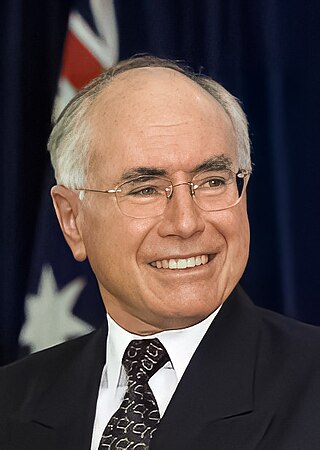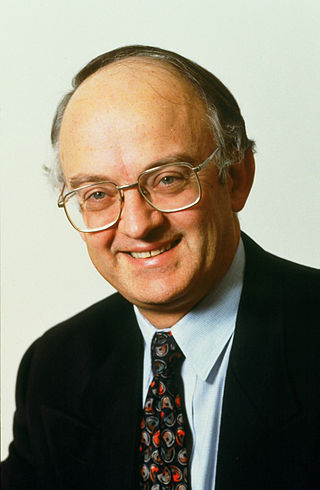
Edward Gough Whitlam was the 21st prime minister of Australia, serving from December 1972 to November 1975. To date the longest-serving leader of the Australian Labor Party (ALP), he was notable for being the head of a reformist and socially progressive government that ended with his controversial dismissal by the then-governor-general of Australia, Sir John Kerr, at the climax of the 1975 constitutional crisis. Whitlam remains the only Australian prime minister to have been removed from office by a governor-general.

The Division of Werriwa is an Australian electoral division in the state of New South Wales. The name Werriwa derives from a local Aboriginal name for Lake George, which was located in the division when it was established in 1900. The division was one of the original 65 divisions first contested at the first federal election.

The 2004 Australian federal election was held in Australia on 9 October 2004. All 150 seats in the House of Representatives and 40 seats in the 76-member Senate were up for election. The incumbent Liberal Party of Australia led by Prime Minister of Australia John Howard and coalition partner the National Party of Australia led by John Anderson defeated the opposition Australian Labor Party led by Mark Latham.

The 1996 Australian federal election was held to determine the members of the 38th Parliament of Australia. It was held on 2 March 1996. All 148 seats of the House of Representatives and 40 seats of the 76-seat Senate were up for election. The centre-right Liberal/National Coalition led by Opposition Leader John Howard of the Liberal Party and coalition partner Tim Fischer of the National Party defeated the incumbent centre-left Australian Labor Party government led by Prime Minister Paul Keating in a landslide victory. The Coalition won 94 seats in the House of Representatives, which is the largest number of seats held by a federal government to date, and only the second time a party had won over 90 seats at a federal election.

Robert Francis McMullan is a former Australian politician. A member of the Australian Labor Party (ALP), he was a cabinet minister in the Keating government as Minister for Arts and Administrative Services (1993–1994) and Minister for Trade (1994–1996). He was a member of federal parliament for over 22 years, initially as a Senator for the Australian Capital Territory from 1988 to 1996 and then as a member of the House of Representatives from 1996 to 2010. Prior to entering parliament he was state secretary of the ALP in Western Australia from 1975 to 1981 and national secretary from 1981 to 1988.
The Division of Mayo is an Australian electoral division located to the east and south of Adelaide, South Australia. Created in the state redistribution of 3 September 1984, the division is named after Helen Mayo, a social activist and the first woman elected to an Australian University Council. The 9,315 km2 rural seat covers an area from the Barossa Valley in the north to Cape Jervis in the south. Taking in the Adelaide Hills, Fleurieu Peninsula and Kangaroo Island regions, its largest population centre is Mount Barker. Its other population centres are Aldgate, Bridgewater, Littlehampton, McLaren Vale, Nairne, Stirling, Strathalbyn and Victor Harbor, and its smaller localities include American River, Ashbourne, Balhannah, Brukunga, Carrickalinga, Charleston, Cherry Gardens, Clarendon, Crafers, Cudlee Creek, Currency Creek, Delamere, Echunga, Forreston, Goolwa, Gumeracha, Hahndorf, Houghton, Inglewood, Kersbrook, Kingscote, Langhorne Creek, Lobethal, Macclesfield, McLaren Flat, Meadows, Middleton, Milang, Mount Compass, Mount Pleasant, Mount Torrens, Mylor, Myponga, Normanville, Norton Summit, Oakbank, Penneshaw, Piccadilly, Port Elliot, Second Valley, Springton, Summertown, Uraidla, Willunga, Woodchester, Woodside, Yankalilla, and parts of Birdwood, Old Noarlunga and Upper Sturt.
Branch stacking is a term used in Australian politics to describe the act of recruiting or signing up members for a local branch of a political party for the principal purpose of influencing the outcome of internal preselection of candidates for public office, or of inordinately influencing the party's policy.

A general election was held in the Northern Territory, Australia, on 18 June 2005. The centre-left Labor Party, led by Chief Minister Clare Martin, won a second term with a landslide victory, winning six of the ten seats held by the opposition Country Liberal Party in the 25-member Northern Territory Legislative Assembly, bringing their total to 19. It was the second largest victory in any Northern Territory election. The only larger majority in the history of the Territory was in the first election, in 1974. In that contest, the CLP won 17 of the 19 seats in the chamber, and faced only two independents as opposition.

The 1990 Australian federal election was held in Australia on 24 March 1990. All 148 seats in the House of Representatives and 40 seats in the 76-member Senate were up for election. The incumbent Australian Labor Party, led by Bob Hawke, defeated the opposition Liberal Party of Australia, led by Andrew Peacock, with its coalition partner, the National Party of Australia, led by Charles Blunt, despite losing the nationwide popular and two-party-preferred vote. The result saw the re-election of the Hawke government for a fourth successive term, the first time the ALP had won four consecutive terms.

Maxine Margaret McKew is a former Australian Labor politician and journalist; she was the Parliamentary Secretary for Infrastructure, Transport, Regional Development and Local Government in the First Rudd Ministry and the First Gillard Ministry.

The 2006 Victorian state election, held on Saturday, 25 November 2006, was for the 56th Parliament of Victoria. Just over 3 million Victorians registered to vote elected 88 members to the Legislative Assembly and, for the first time, 40 members to the Legislative Council under a proportional representation system. The election was conducted by the independent Victorian Electoral Commission.

The 2005 Werriwa by-election was held in the Australian electorate of Werriwa in south-western Sydney on 19 March 2005, after the resignation of Labor MP Mark Latham, who had represented the electorate since 1994. Latham had been federal Opposition Leader since 2 December 2003 and led Labor to defeat at the 2004 election. He had become increasingly dissatisfied with politics and was struggling with recurring pancreatitis. He announced his resignation from parliament on 18 January 2005.

The 1917 Australian federal election was held in Australia on 5 May 1917. All 75 seats in the House of Representatives and 18 of the 36 seats in the Senate were up for election. The incumbent Nationalist Party, led by Prime Minister Billy Hughes, defeated the opposition Labor Party led by Frank Tudor in a landslide.
The 1997 Fraser by-election was held in the Australian electorate of Fraser in the Australian Capital Territory on 1 February 1997. The by-election was triggered by the resignation of the sitting member, the Australian Labor Party's John Langmore on 6 December 1996. The writ for the by-election was issued on 30 December 1996.

The 1995 Wentworth by-election was held in the Australian electorate of Wentworth in New South Wales on 8 April 1995. The by-election was triggered by the resignation of the sitting member, former Liberal Party of Australia leader Dr John Hewson on 28 February 1995. The writ for the by-election was issued on 3 March 1995.
The 1996 Blaxland by-election was held in the Australian electorate of Blaxland in New South Wales on 15 June 1996. The by-election was triggered by the resignation of the sitting member, the Australian Labor Party's Paul Keating on 23 April 1996. The writ for the by-election was issued on 13 May 1996.
Charlie John Stuart Lynn is an Australian former politician who served as a Liberal Party member of the New South Wales Legislative Council between 1995 and 2015.

The 2011 New South Wales state election held on Saturday, 26 March 2011. The 16-year-incumbent Labor Party government led by Premier Kristina Keneally was defeated in a landslide by the Liberal–National Coalition opposition led by Barry O'Farrell.
A by-election was held for the Australian House of Representatives seat of Oxley on 8 October 1988. This was triggered by the resignation of former Labor Party leader Bill Hayden to become Governor-General.
Two leadership spills of the Australian Labor Party (ALP), the official opposition party in the Parliament of Australia, were held on 16 June 2003 and 2 December 2003, respectively. The Opposition Leader, Simon Crean, won the ballot in June against former opposition leader Kim Beazley, but resigned as leader in late November after losing support from his colleagues and did not contest the December ballot which Mark Latham won against Kim Beazley.














